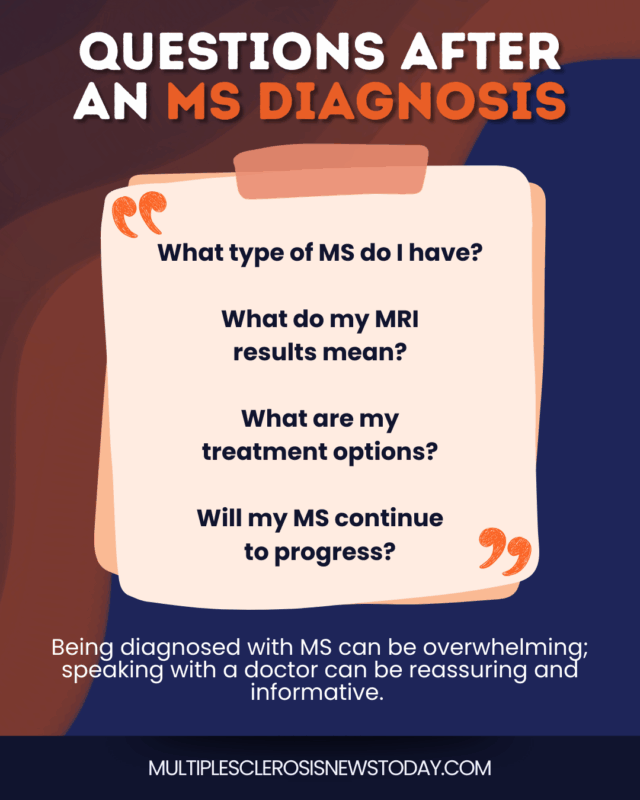
Newly diagnosed with MS: 12 questions to ask your doctor
Each day, at least 300 individuals are diagnosed with multiple sclerosis, and it’s thought to affect some 2.8 million people globally.
Learning you have multiple sclerosis (MS) can be shocking and confusing. You know you need more information — a lot of it — but you aren’t sure where to start or what questions to ask.
Asking your healthcare provider the right questions can be a good first step toward successfully navigating your new life with MS.
“[Doctors] become a character in each patient’s story, and we will impact how that story unfolds from that moment. This is a responsibility, but also a privilege and an opportunity,” said Annie Brewster, MD, a practicing internist at Massachusetts General Hospital in Boston who also has MS. “I now clearly understand that a doctor’s job is not simply to diagnose and ‘manage’ diseases, but rather to partner with patients in the ongoing journey of navigating illness.”
While the disease course is different for each person, here is a guide that can help you cut through the fog and get to the heart of your MS diagnosis.
12 questions to ask your doctor after an MS diagnosis
We asked some of our community contributors at Multiple Sclerosis News Today for questions they think people newly diagnosed with MS should be asking their doctors. While not exhaustive, this list is meant to help you gain a fundamental understanding of your condition and how it will affect your life.
Not all these questions may come up during your first visit with your neurologist, but asking them early on can help better prepare and inform you about what to expect as you learn how to live with MS.
1. Do you specialize in MS?
Neurologists are qualified to make an MS diagnosis; however, not all neurologists specialize in MS.
Ed Tobias, a Multiple Sclerosis News Today columnist and forum moderator, said it is important for MS patients to have an MS specialist.
“In my experience in dealing with other people with MS, I hear all the time that general neurologists just don’t understand the disease and that you’ll get a much better result if you go to a specialist,” said Tobias, 73, a retired Florida resident who was diagnosed with relapsing-remitting MS in 1980, which has since transitioned to secondary progressive MS. “It’s hard to find them, especially outside of metropolitan areas, and that’s a problem.”
Desiree Lama, a community collaborator for Multiple Sclerosis News Today, was in her senior year of high school when she was diagnosed in 2016 with relapsing-remitting MS. “When I was diagnosed, we were looking for a specialist because I got referred to a neurologist who didn’t really tell me anything,” said Lama, 23, of Texas. “He was, like, ‘Go and research MS and come back.’ And I was confused because I was young and really didn’t know what it was.”
Although her family “lucked out” and found a specialist, Lama said that what is most important is that the neurologist has experience with MS diagnoses.
Allen Bowling, MD, PhD, is an internationally recognized neurologist and integrative medicine pioneer with more than three decades of clinical and research experience. He has devoted his career to the care and treatment of people with MS.
He said that while the question about MS specialty is “good,” especially for those who live in rural areas, the fact is most MS patients are cared for by a general neurologist. “If it’s a three-hour drive, I’m not sure a patient needs to see a specialist on an ongoing basis,” said Bowling, who leads the NeuroHealth Institute in Englewood, Colorado, and is a clinical professor of neurology at the University of Colorado.
Your primary care provider may be able to provide you with a referral to an MS specialist. Ultimately, your neurologist should be someone who has the expertise to help you manage and treat your disease, communicates well, and makes you feel comfortable and heard.
2. What type of MS do I have?
MS is broadly classified into four main types based on disease progression: clinically isolated syndrome, relapsing-remitting, secondary progressive, and primary progressive. Knowing which form of MS you have can help you understand your specific symptoms and treatment options.
It’s appropriate to ask your neurologist whether they are “confident” you have a certain MS type, Bowling said. However, if there is any murkiness about your diagnosis, ask how certain they are that you even have MS. If there is uncertainty, you should consider getting a second opinion.

3. What do my MRI results mean?
Magnetic resonance imaging, or MRI, is used to help diagnose MS and to monitor and track the disease’s progression, which can aid in making treatment decisions.
MS is characterized by brain lesions, which are areas in the central nervous system that have been damaged due to MS attacks. On MRI scans, they show up as spots. Neurologists can analyze specific MRI scans to determine the number of lesions, their size and shape, and whether they are active or inactive.
MRIs can also be used to measure the degree and rate of brain volume loss in MS patients, which can help predict disease course and progression. Evidence shows that brain volume loss in MS appears to correlate with long-term physical and cognitive disability.
Rates of brain volume loss can also aid in making treatment decisions. In fact, one of the goals of several disease-modifying therapies is to slow down brain volume loss or brain atrophy.
Understanding your MRI results is important. Your neurologist should take the time to explain your MRI reports and what they mean for you as the patient.
“Someone could ask, ‘How many lesions do I have, and can I look at my MRI?’ That might make things more real to them,” Bowling said. “If someone is told they have five lesions and they can see these five small spots, that can be sort of reassuring. Or if the doctor says you have 20 lesions that are quite large and we need to push hard on treatment, viewing the MRI can back that up.”
Arelis Castillo, 30, is a community collaborator for Multiple Sclerosis News Today. A Connecticut resident, Castillo was diagnosed with relapsing-remitting MS in 2018. She said that, following her MS diagnosis, it was important to her to understand the information she had come across while doing her own research about the disease.
“I went to my doctor and said, ‘Explain lesions, where they are, and how they’re going to affect me.’ It’s highly important just to understand it,” she said.
Bowling said patients should be mindful, however, that MRI results are limited in terms of what they might mean for them in their daily lives. Symptoms may progress without the appearance of new lesions; conversely, new lesions don’t always correlate with new symptoms.
“There isn’t a real great correlation between results and quality of life,” he said.
4. How does an MS diagnosis affect my quality of life?
After being diagnosed with a chronic disease like MS, it’s natural to have questions about your prognosis and how the disease will affect your daily life. While the answer to this question will differ depending on the individual circumstances, your neurologist should be able to help you come to terms with your diagnosis and provide some guidance on managing your MS on a day-to-day basis.
As a progressive disease, MS leads to increasing disability over time, be it physical and/or in terms of cognition. It is estimate that more than half of MS patients will experience cognitive problems — damage to the nervous system in MS can cause difficulty with thinking or reasoning, planning, problem-solving, and learning.
“When I got the diagnosis, I went home and had a panic attack,” said Multiple Sclerosis News Today community collaborator Rochelle Roberts, 47, who was diagnosed with relapsing-remitting MS in 2020. “I wasn’t asking clinical questions, I was asking quality-of-life questions like, am I going to have trouble walking all the time? Those were the things I wanted to know.”
Tobias said, “The most important question I asked when I was diagnosed was, is this going to shorten my life? When I heard, probably not by much, it was OK.”
5. What should I do if I think I’m having an exacerbation or experiencing a new symptom?
Also known as a relapse or flare-up, an exacerbation in MS is the occurrence of new symptoms or the worsening of existing symptoms. Because MS and its symptoms are so variable, it may be difficult to determine whether something you are experiencing is a result of your disease or something different.
“[This] question is a good way to get a read on a neurologist,” Bowling said. “If they hedge or don’t get back with me that day, that’s concerning.”
Open communication with your neurologist about anything new or different you are experiencing can help them determine if your disease is progressing or if you are having a relapse, as well as assist them in making treatment decisions.
Said Lama: “Whenever I think I’m experiencing something new, I’ll Google it to see if it’s something else or an MS symptom, and then I’ll reach out to my MS specialist, and if I feel like it’s completely necessary to go see her, I’ll schedule an appointment so we can talk about it.”
Keeping track of your symptoms may also help you and your neurologist identify any possible triggers that may cause an exacerbation. These can include stress, heat, smoking, fatigue, and infection, among others.
6. Will my MS continue to progress?
Multiple factors, including those genetic and environmental in nature, likely contribute to the development and progression of MS.
“As soon as I was diagnosed, I assumed it would progress,” Roberts said. “That’s the mindset I’m perversely preparing myself for. I think it’s a valid question, since everyone gets diagnosed at a different stage. It’s basically a ‘what’s next?’ question.”
Each patient journey is different, making it difficult to predict the course of the disease for each individual. Some patients may progress faster than others. MS risk factors that can affect the disease course include the disease type, treatment, lifestyle factors, and biological traits.
Bowling said it’s important that patients have realistic hope about their future. “Many physicians assume MS is a homogeneous disease, but it’s not,” he said. “And they’ll look at statistical averages for 500 people. But it’s unfair to patients to convey that.”
In that light, patients might want to ask their doctor how things look for them now in their MS course, Bowling said.
7. What are my treatment options, and which one is best for me?
With a number of approved MS-modifying medications now available, it’s the duty of the neurologist to narrow those options down to the two or three that are most reasonable for the patient, Bowling said.
Treatment plans should be discussed between healthcare providers and patients, and they should take into account the patient’s preferences, symptoms, their physical and cognitive function, and MS type, as well as clinical factors such as disease severity (how active it is), MRI data, and the rate and degree of brain volume loss.
“If only one option is presented, that’s concerning,” Bowling said, adding that patients should ask about potential side effects.
Castillo said, “These are valid questions about treatment because you really want to get on the right one, for whatever stage you start off with.”
When Roberts was diagnosed, her neurologist explained her disease stage and ultimately presented her with three MS treatment options, plus their top choice. They also delved into the efficacy, intensity, and possible side effects of each treatment. “It came down to, which one do you think is best, and what can I expect from it?” she said.
8. Does my insurance cover my MS treatments?
The financial issues that come with dealing with a chronic condition like MS can be just as stressful as the disease itself. It’s important to understand early on what your options are and the type of coverage your insurance provides for your treatments. Likewise, if you don’t have insurance, you should inquire about any alternatives that may be able to help you.
“I try to keep insurance out of it until we come up with the drug that seems like the best,” Bowling said. “Then we push as hard as we can on the insurance side.”
“MS is stressful, but having financial stress adds on to it. It’s just really important to have these questions answered so that people feel at ease and know they’re going to be getting the things they need for their health,” Castillo said.
9. What else can I do to manage my symptoms on a day-to-day basis?
In addition to medications, other strategies may help MS patients manage their symptoms and feel their best. Bowling refers to this as “integrative medicine,” a combination of conventional and non-pharmaceutical approaches and lifestyle practices such as diet, exercise, physical therapy, and coping strategies for stress, anxiety, and depression.
“I think much of the time spent in MS clinics is devoted to disease-modifying treatments, and very little time is spent on treating specific symptoms,” Bowling said. “So, it’s worth asking about medication and non-medication approaches to managing symptoms.”
“It’s a very important question,” Castillo said. “I always look at things as like a balance. I’m dealing with the [disease-modifying treatment] side of it, but what are other things you can do? Exercise, different workouts, meditation, yoga … it’s important to highlight these as well because that’s also dealing with symptoms.”
Brewster said, “In truth, making healthy lifestyle choices will improve life overall, not just MS.”
10. What specialists should I see to manage my disease and symptoms?
The National Multiple Sclerosis Society advises a comprehensive, coordinated care approach to managing MS. This often involves the expertise of different healthcare professionals besides neurologists — such as primary care physicians, urologists, rehabilitation therapists, and mental health providers.
While your neurologist may be the one who makes the treatment decisions, it’s important to understand how other healthcare providers and specialists may work together to ensure the best comprehensive management of your particular situation.
11. What do I do if I don’t feel my medication is working, or I can’t follow the regimen?
Because each patient will have a different disease experience, their treatment will also be unique. This is because the disorder can affect different parts of the central nervous system and cause a broad range of symptoms with varying severity. Also playing a role in this variability are the different types of MS.
MRI results may be used on an ongoing basis to determine whether or not the chosen therapy is effective. If brain volume loss progresses significantly, it could be an indicator the therapy is not working. Likewise, significant rates of decline in cognition or physical abilities may also be a determining factor in a therapy’s effectiveness.
Bowling said a more specific question could be, “How will I know if my medication is working or not?”
Patients may not be able to follow a treatment regimen for several reasons. For example, the method of administration — which can include injectables or oral medications — may no longer be tolerated. Or perhaps the side effects of a particular medication become unmanageable.
If you are having trouble adhering to your treatment for any reason, you should bring this issue to the attention of your neurologist for their guidance and recommendation.
12. Are there any clinical trials that may be an option for me?
Clinical trials are at the center of medical advances. The goal of these trials is to evaluate whether a device, procedure, or pharmaceutical therapy is safe and effective. Such studies also may assess new ways of using existing treatments, gauge other aspects of care, or simply record daily life with a condition over time.
People with the disease — in this case, MS — and healthy volunteers, known as controls, may be enrolled in clinical studies. All participants are monitored so that any issue or potential risk is identified as soon as possible. These trials are regulated by law and require federal approval before they start.
“People are hungry for clinical trials fairly early on, in the discussions I see,” said Tobias, who participated in one study early in his patient journey but didn’t receive an actual treatment candidate.
Bowling said, “Trials were a big deal 15 years ago when there weren’t so many drugs. Now, I think most people with MS will go to a trial and not be sure which treatment they’ll be on. But it’s rare that someone will risk knowing.”
Final words of wisdom
In all, the most important thing about doctor visits — early on and beyond — is that you feel comfortable, Brewster said.
“Trust your instincts,” she said. “You should feel respected, cared for, and attended to. If you feel otherwise, pay attention to this and consider finding a different provider. Doctors are busy, but you should not feel rushed or ignored. We all need to feel like our doctors are listening to us and taking us seriously.
“You deserve this.”
Multiple Sclerosis News Today is strictly a news and information website about the disease. It does not provide medical advice, diagnosis, or treatment. This content is not intended to be a substitute for professional medical advice, diagnosis, or treatment. Always seek the advice of your physician or other qualified health provider with any questions you may have regarding a medical condition. Never disregard professional medical advice or delay in seeking it because of something you have read on this website.
 Fact-checked by
Fact-checked by 





